One year after 24 million cubic metres of mine sludge and water swept into rivers and lakes below Imperial Metal’s Mount Polley mine in B.C., Southeast Alaskans will gather to commemorate the tailings pond breach and bless the Stikine River.
Those at the Aug. 2 gathering in Wrangell, where the salmon-rich Stikine runs into the ocean, will also be looking for ways to ensure there is no Mount Polley-style disaster in the B.C. headwaters of the Iskut River, a major tributary of the Stikine, where Imperial Metals has opened the Red Chris mine.
The ceremony will be hosted by Wrangell Cooperative Association, and tribal administrator Aaron Angerman said he hopes other Southeast Alaskan communities will follow suit and hold their own ceremonies.
“I am frightened to think that what happened at Mount Polley could happen here in our backyard now that the Red Chris mine is operational — that the fish we’ve relied on traditionally for thousands of years could be contaminated or disappear, that the local commercial fishing industry could be decimated and that we could see the local businesses that rely on the industry close doors,” he said.
Red Chris — one of about 10 B.C. mines planned for the transboundary area — opened for business two days after the first report into the Mount Polley disaster was released.
Despite a recommendation in that report that companies should consider dry stack tailings storage Red Chris is using a tailings dam similar to Mount Polley.
Imperial Metals plans to store tailings in Black Lake, behind a dam. It is estimated that, over the life of the mine, there will be more than 300 million tonnes of mine waste, some of it acidic, that will require water treatment in perpetuity.
Raw footage from the Mount Polley mine spill. Credit: Cariboo Regional District
Lax B.C. Mining Rules Cause Concern
Anxiety about perceived lax mining regulations in B.C and lack of Alaskan input into mine approvals close to salmon-bearing rivers, escalated after the Mount Polley breach. Many Alaskan groups and local politicians are now pushing for the matter to be referred to the International Joint Commission for a ruling under the Boundary Waters Treaty, which says water flowing across the boundary should not be polluted.
The Wrangell ceremony will kick off with a procession through downtown Wrangell followed by a blessing of the waters in front of the Tribal House.
Tribal leaders, government officials, conservation groups and community members will then hold strategy sessions.
“I hope the Aug. 2 ceremony highlights how concerned people are on both sides of the border about major risks to the Stikine River and other transboundary rivers from large-scale and risky mine developments in B.C.,” said Oscar Dennis, Iskut First Nation spokesman.
Speakers will include Jacinda Mack, Northern Shuswap Tribal Council mining team coordinator, who lives and works in the area affected by the Mount Polley breach.
Mount Polley Spill Impacts Linger as Mine Reopens
On Wednesday the province released its first phase progress report on Mount Polley remediation, but Mack said in a news release that First Nations concerns were not fully addressed before the government allowed a partial re-start at Mount Polley and many are losing faith in the process.
“It appears that it is simply business as usual. There have been no fines, no criminal charges, no approved long-term water treatment and management plan and the company still gets permitted to operate. It’s a disgrace,” she said.
It is too soon to know the long-term impacts, but life around Mount Polley will never return to the way it was, Mack said.
“It was described as a feeling of death in our community when the disaster happened,” she said.
The province has given Imperial Metals a conditional permit to reopen Mount Polley with restrictions. The company must give the provincial government a long-term water treatment and discharge plan by next June.
Mining Accidents Worsening, Finds Report
In another acknowledgement of the Mount Polley anniversary, Washington D.C.-based Earthworks Action has released a report by David Chambers, a mining specialist with the Center for Science in Public Participation and Lindsay Bowker of Bowker Associations Science and Research in the Public Interest, which finds that catastrophic mining spills are increasing in frequency, severity and cost.
The report shows that the Mount Polley failure is part of a global trend of industry and regulators failing to implement best practices to minimize environmental and financial risks.
The analysis finds that half of the serious tailings dam failures in the last 70 years occurred between 1990 and 2009 and says the increasing rate of tailings dam failures is directly related to the growing number of tailings storage facilities larger than five-million cubic metres.
The report predicts 11 catastrophic failures between 2010 and 2019, costing a total of $6 billion, or $543 million per spill.
“More mining waste disasters like Mount Polley are inevitable,” Chambers said, adding that, as most mining companies cannot afford or cannot secure insurance to cover catastrophic failures, damage is often not repaired or taxpayers dollars pay for remediation.
“As a result of the Mount Polley investigation, mining companies and regulators know they have to change mine waste disposal practices to minimize the risk of future disasters,” Chambers said.
“Unfortunately, as evidenced by the recent approval for mines in the Alaska/British Columbia transboundary area, they are failing to do so.”
Image Credit: Cariboo Regional District
Subscribe to our newsletter
Stay up to date with DeSmog news and alerts







